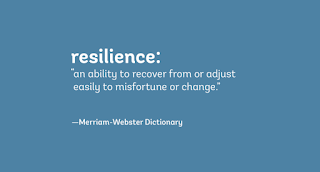5 Activities to Build Resilience
“Resilience is accepting your new reality, even if it's less good than the one you had before. You can fight it, you can do nothing but scream about what you've lost, or you can accept that and try to put together something that's good.”
Elizabeth Edward
How are you dealing with the new “normal”? How did you deal with the effects of the pandemic and lockdown? Most of us are now getting back to our routines, taking charge of our lives, and moving on.
Resilience is an ability that helps us deal with adverse situations, adapt to the circumstances, and help us thrive in situations. Resilience is a skill that can be learned. We bring you five activities that can help you become more resilient. You can choose the one that suits you or you can use all five of them.
Story Telling
We all love reading, telling, or listening to stories. Stories, since our childhood, have helped us learn about the life, values, ethics, etc. Stories are a great source of learning. Stories have always inspired us.
We can build resilience through storytelling too! Stories- both sharing our experiences and listening to those of others are at the center of building resilience. Stories help us come to terms with the situation and help us make sense of it. Research has shown that the foundation of a person’s resilience is writing a meaningful story and then supporting it with evidence. We can also rewrite our stories with a more positive and optimistic
Do you appreciate other’ perseverance when they share their stories of struggles? When we listen to other’s stories of struggles and how they dealt with obstacles, we often become motivated to deal with our issues at hand. We often find ourselves thinking, “If they can do it, I can do it too.” Listening to other’s stories can help in relationship and trust-building.
Laugh Out Loud: Add some humor
A sense of humor can play a role protective wall when it comes to coping with crises. Humour will help you build resilience and will also improve your physical and emotional well-being. There have been multiple pieces of research that have studied the impact of humor on dealing with adversity.
How do we use humor during a crisis? Start practicing the following activity every day for 10 minutes.
At the end of your day, write down three funny incidents you experienced during your day. Write down the details of the incident and how they made you feel. If you are not able to think about anything, you can watch a stand-up comedy or read funny stories or check out memes.
Write down why you found the incident funny. Add as many details as possible. More details, more effective the exercise will be. Doing so will foster a new habit and will help you feel happy before sleep. By doing this activity during a crisis situation, you will be able to identify or add humor to your otherwise stressful day.
Mindful Breathing
When you are stressed and don’t know how to deal with the situation at hand, mindfulness can help you cope. Practicing mindful breathing requires you to focus your attention on exhalation and inhalation.
4-7-8 technique forces the mind and body to focus on regulating the breath, rather than replaying your worries.
- Exhale through your mouth, making a whoosh sound.
- Inhale through your nose to a count of four.
- Hold your breath for a count of seven.
- Exhale completely through your mouth, making a whoosh sound to a count of eight.
- This is one breath.
Repeat the cycle three more times for a total of four breaths.
Practice Gratitude
Being thankful and practicing gratitude have several benefits. Gratitude is known to enhance resilience. It also improves the overall well-being of the person. There are several ways through which you can practice gratitude.
- Maintain a gratitude journal. You can write about things you are grateful for in a journal.
- Write a letter of gratitude to a close friend or a family member
- Tell people you see every day what you appreciate about them.
Read more about gratitude here: https://www.thecyanproject.org/2020/04/when-you-are-thankful-and-you-know-it.html
Find your silver lining
Every sunset is followed by a sunrise! As clichéd as it sounds, it is the truth of life. Every adverse situation has an end. Being optimistic and looking at the brighter side helps you become more resilient and helps you deal with the situation in a much better way.
Think about an upsetting experience you have had recently. It could be a small example (i.e., I missed my office cab this morning and ended up taking an off). Rather than focusing on the frustration of the experience, reflect on three positive things about it. You probably spent some time with your family or finished household chores.
Becoming resilient is not difficult, dealing with adversities is not difficult! You need to be a little patient and keep working towards it.



Comments
Post a Comment